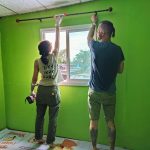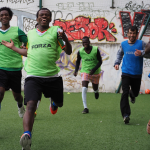By Mary McColley
It was the season of monsoon and mangoes. May 17th: Serve the City Global Volunteer Day, and the launch of the Serve the City branch of the thronging, hawking, roaring, impossible metropolis of Bangkok. This goliath of a city counts some 11 million residents to its name, but on that day, we were just four: Peter and Patricia DeWit; the capable and confident Lisa, khun Thai; and myself, a meandery somewhat-American. Lisa’s steady hand wove a path driving in and out of Bangkok’s notorious traffic; she slowed to park on a dirt lot of On Nut 84, Prawet District.
When we stepped out of the car, it was the smell that came first: sickly sweet, noxious, of rot and of degradation. The community where we found ourselves was built around a trash-sorting facility. This work is viewed as dirty and undesirable, and often relegated by Thais to the immigrant Burmese population. Everywhere, trash whelmed. Heaping summits of black bags, bursting at the seams; flattened plastics; crushed aluminum, in colors shiny as candy and speckled by open-mouthed flies. The ground was an unspeakable black silt. The stench colored the air.
And just adjacent to these mounds of refuse, sat 40-odd children on bright green plastic chairs. Some looked confused, others bored, or suspicious at the sight of strangers.
« Sawasdee ka! » Patricia and I called out. Pat cupped her hands around her mouth to amplify her quiet voice, and explained in Thai that we had come to do an activity afternoon — one that started with a dance.
Right, left, right, left! The kids were out of their seats and practicing; Patricia was throwing out her arms with vigor and rhythm, although perhaps not with 100% accuracy on which was left and which was right. Two steps to the right, pump the air, barrel-roll your hands in a four-square step, then jazz hands and twirl all the way round.
She started the music from a turquoise speaker and the 70s beats resounded as we laughed and fumbled our way through the dance steps. I glanced over my shoulder and snagged a smile from one of the sullen girls who had sat with folded arms at the start, now whirling away. Next was a three-team race of sorting alphabet tiles, then the biggest challenge, or rather, the lowest: limbo. I placed careful stickers of neon green on Team Nung’s shirts, asking each name as I went and receiving the shy answers: Nan, Easy, Port. More music sprang out, jubilant, from the speakers as one by one, the kids raced beneath an ever-lowering chain of colorful, hand-knotted elastics. Faces and spines contorted; the audience of the less flexible clapped and called approval to the competitors. Port was the champion. I watched his face as he realized he had won amidst the general applause, and how a quiet pleasure scribed upon his features.
After the green chairs were carried down a dusty lane and put away, and meals handed out to all the kids participating — hamburgers or spaghetti with chicken in a bright white tote bag — Patricia and I went to see where Peter and Lisa had gone, on an intensely demanding mission: the home of Khun Ngok.
With two kids as our guides, we wound our way over the thin cement paths between shacks, doors left open to the stifling heat. Children teemed in one doorway around their grandmother’s shoulders; another old woman sitting on the opposite stoop, blind, responded to our greeting with a wrinkled smile, her eyes vacant. On the doorstep of Khun Ngok’s house sat an impossibly-tiny black kitten who looked up at us with bleary eyes. Slipping out of our shoes and leaving them to the feline’s guardianship, we climbed a steep staircase to a room painted lime-green and filled with an oppressive, stagnant air. The temperature was easily 40°C. « Ron, » everyone repeated. « Ron mak. » So hot. It was difficult to stand for a few moments — but someone lived there, day in and day out, all but motionless on the ground. Khun Ngok.
« Jesus, have mercy, » murmured Patricia as she saw the man’s scant frame sprawled on the thin mattress. It’s not clear what Khun Ngok’s diagnosis is, but his symptoms seem consistent with that of a stroke. He is paralyzed on one side and cannot walk; it hurts him to sit upright, so he remains lying flat on the ground, on a dirty, cobalt mattress stained with human feces. He cannot communicate clearly. White diapers swaddle his thin form.
And Lisa and Peter, with infinite care, had taken this old man’s light body in their hands and bathed him. Peter wiped the crust of months-old food from the man’s lip, scrubbed the skin-sore limbs clean. Lisa cradled him in balance as sharp electric clippers sheared through the mat of his wild grey hair and tangled beard. Shaved, bathed — how long had it been?
They cleaned the mattress and room as best they could, and replaced the old curtain — just an orange sheet tied to a clothes hanger — with a new pleated curtain and secure rod over the one window, to offer a bit of respite from Thailand’s blistering sun. A touch-activated lamp, a storage container filled with new Pampers diapers; they filled garbage bag after garbage bag and left the room as clean as was possible. Khun Ngok couldn’t say much, but his eyes followed them steadily. I saw the ghost of a smile on his lips.
The sky was a violent blue when we left that high, hot green room, all of us sticky with sweat. The black kitten hid under my leg and batted at my fingers; the clouds spattered a few warning drops of rain. We made our way through the same labyrinth of small homes, waving goodbyes, and climbed back into Lisa’s car. What a day. And how heavy it is, to see people living in such difficulty. It would be easier to turn a blind eye, to be sure. But that cannot be the answer.
« I was a Christian for my whole life, » said Lisa as we sipped icy beverages in a nearby café. The pungent odor of trash still bannered the air. « But the past few years, I really connect with God again and I see how we’re called to be active. »
« Exactly. » Patricia nodded. « God and the church aren’t a one-day event. We put so much emphasis on going to church, but the rest of our lives need to coalesce with service. Our neighbors shouldn’t point out how we live on Monday, Tuesday, Wednesday as the hypocrisy of what we sing on Sunday. And what we’re doing, what we did today, was helping our community. It’s important not to think of us just as outsiders coming in to give something and then leaving, separate, but rather as part of the extended community of the city. We are all Bangkok. »
« I can’t wait for a shower, » was Peter’s insightful contribution.
I thought about Patricia’s words late into the night, as cicadas rioted in the grey city dark and the sky-train ricocheted back and forth across the hours. Jesus, have mercy. Matthew 25:40-45 paints a vivid picture of a king who rejects those who never helped the hungry, the poor, the needy. « The King will reply, ‘Truly I tell you, whatever you did for one of the least of these brothers and sisters of mine, you did for me,’ » the verse reads.
Let us be the hands reaching out, in Bangkok and across the globe. Let us be the mercy.






